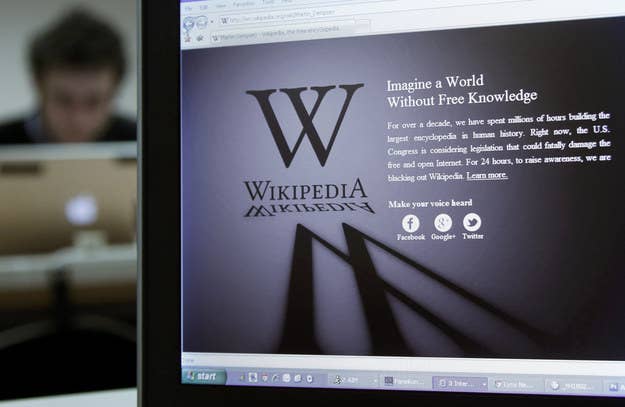
Russia ordered several internet service providers to block Wikipedia throughout the country after the volunteers who run the user-generated online encyclopedia refused to delete an article — then abruptly reversed its decision less than 24 hours later.
Roskomnadzor, Russia's communications watchdog, reversed its decision to order internet providers to block a page on Russian-language Wikipedia on Tuesday after users edited the offending article, the agency said. Earlier, the agency had said on Monday that the offending article — an entry about charas, an Indian form of hashish — was banned under a recent court decision in Cherny Yar, a town of 8,000 people on the southern reaches of the Volga River.
Russian Wikipedia editors had changed the URL of the page in the hope that this would remove the offending information from the page in the court decision, but did not alter the content of the page. The page is now a disambiguator for several pages named "Charas," including an island on the remote Indigirka river in northeastern Siberia and two Indian films of that name. Roskomnadzor, however, said that the page would remain banned until the offending material is removed from the site. "The illegal character of the information posted to Wikipedia has been confirmed by expert analysis and a corresponding decision of the Federal Drug Control Service of Russia," the statement said.
Though the court decision only asks to block one link, the agency said that about 30% of providers would be required to block Wikipedia in its entirety because it uses secure https protocol. It's unclear why Roskomnadzor says that would require blocking the entire website or would allow the other 70% of ISPs to continue to access Wikipedia.
In a statement provided to BuzzFeed News, the Wikimedia Foundation, Wikipedia's parent organization, said it supported editors' defiance of the ban. "Censorship of Wikipedia content runs contrary to the Wikimedia vision: a world in which everyone can freely access the sum of all knowledge," the statement said. "The Wikimedia Foundation supports the Russian Wikipedia community and encourages the Russian government to reconsider this decision."
Russia has several laws that mandate blocking content online for a number of reasons ranging from "extremism" to "promoting drugs, suicide, and pedophilia" and arbitrary decisions given no explanation. The laws are implemented by several different agencies, rarely with any consistency. Roskomnadzor has banned or threatened to ban websites including Reddit, Github, Vimeo, and BuzzFeed in recent months, only to reverse the decision days later in most cases.
Russia has ramped up its internet censorship efforts in the years since Vladimir Putin returned to the Kremlin, prompting a broad crackdown on dissent. Several websites critical of Putin are outright banned. Likes and retweets of information deemed "extremist" are punishable by up to five years in prison. The country has blocked nearly 12,000 pages in total, according to an unofficial tally kept by net freedom activists.
By Monday evening, reports of Wikipedia being blocked on Russian ISPs began being posted on Twitter and other social media sites.
They did it. Wikipedia now blocked in Russia.
The Wikimedia Foundation's full statement is below.
Today, we received notice that Roskomnadzor, the Russian agency tasked with oversight of Russian communications, has instructed ISPs to block Russian Wikipedia. Censorship of Wikipedia content runs contrary to the Wikimedia vision: a world in which everyone can freely access the sum of all knowledge. The community of volunteers who maintain Russian Wikipedia plans to issue a statement. The Wikimedia Foundation supports the Russian Wikipedia community and encourages the Russian government to reconsider this decision.
With more than one million articles and a billion page views per month, Russian Wikipedia is a rich and valuable source of neutral, reliable information. Russian Wikipedia is built for Russian speakers by Russian speakers, and features rich resources about Russian history, culture, and geography. If implemented, the block will result in millions of people in Russia losing access to free knowledge about the world around them.
We first learned about a possible block last week, when Roskomnadzor issued a notice regarding an article on Russian Wikipedia about charas, a form of cannabis. The notice stated that the article contained information on how to prepare the substance, and was therefore illegal under Russian law. The notice directed Wikipedia to remove the article.
The Russian Wikipedia community has held active discussions regarding the notice and article. Editors have made significant changes to the article, adding further information and citations to reliable sources, bringing it in line with Wikipedia's standards for neutrality and reliability. The community has also added a notification banner to Russian Wikipedia, warning users that the site may be blocked, and offering information about how to access Wikipedia if it is restricted.
Wikipedia is the world's largest free knowledge resource. It is written and maintained by a dedicated community of volunteer editors around the world. Volunteer contributors are responsible for editorial policy, including ensuring articles meet the principles of accuracy, verifiability, and neutrality. Any community may choose to review an article, make an alteration, or remove it entirely if it fails to meet Wikipedia policies and guidelines.
The Wikimedia Foundation does not set editorial policy for the Wikimedia projects. We respect and support the editorial decisions made by the community of editors around the world, including those decisions made by the Russian Wikipedia community.
Every year the Wikimedia Foundation receives requests from governments, individuals, and companies to take down or alter Wikipedia content. We grant few to none, complying only when legally required under U.S. law, as the Wikimedia Foundation subject to U.S. jurisdiction. When content is not illegal under U.S. law, the volunteer editors who maintain Wikipedia generally retain editorial discretion.
